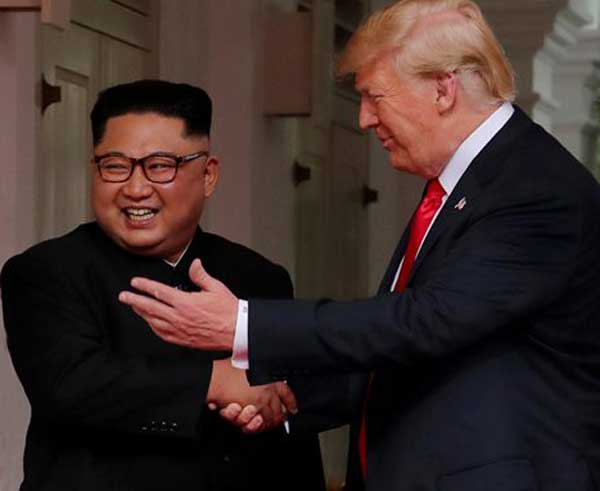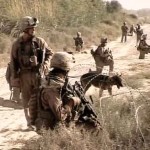 The Singapore summit between Donald Trump and Kim Jong Un is now over. While the massive ups and downs leading up to the meeting had led to almost the entire world being interested in the summit taking place and feeling like a stakeholder in what would surely be a massive win for peace and diplomacy. The resultant declarations from the summit, however, have left countries and analysts across the world wishing for a more structured outcome, instead of the vague declarations, propaganda-style photo-ops, and a surprising suspension of military exercises by the United States with South Korea[i].
The Singapore summit between Donald Trump and Kim Jong Un is now over. While the massive ups and downs leading up to the meeting had led to almost the entire world being interested in the summit taking place and feeling like a stakeholder in what would surely be a massive win for peace and diplomacy. The resultant declarations from the summit, however, have left countries and analysts across the world wishing for a more structured outcome, instead of the vague declarations, propaganda-style photo-ops, and a surprising suspension of military exercises by the United States with South Korea[i].
With most of the analysis on the summit focusing on the lead-up to the summit, and more recently on trying to decide whether it was a success or a failure and debating the ‘comprehensiveness’ of the signed declaration, there has been a suspicious lack of focus given to the reasons why the two leaders met in the first place. With decades of antagonisms between them, and more recent name calling of ‘little rocket man’, ‘dotart’[ii], and statements about who has a bigger nuke button[iii], it seems all too easy to assume that the leaders of one of the most autocratic countries and the self-proclaimed leader of the free world would meet out of high regard for each other, or even the coaxing of China and/or South Korea. Trump and Kim have time and time again proved that they are more strategic than they appear.
Looking beyond the surface reinforces that point. Looking first to the probable reasons for Kim Jong-Un to come to the summit, it becomes fair to assume that economic reasons took priority for him. With the recent economic downturn, the massive investments in military weapon system developments, the country seems to be slowing running out of capital to back itself on. Kim Jong-Un’s recent China trip[iv] to secure urgent coal supply, along with recent pictures of empty shelves in the country’s supermarkets indicate to the fact that there is definitely an economic downturn to the extent that the ruling elites cannot only rely on further support from key leaders to continue their rule. An alliance with the world’s biggest capitalist market, which is always in need of an extended manufacturing base seems to be the ideal solution. An agreement with the United States would possibly bring in new investments, bring legitimacy to the regime, and with a progressive bilateral relationship, may even help remove the sanctions that the country faces with regard to international trade. However, the most important factor in bringing Chairman Kim to the table is fact that his nuclear and missile arsenal is complete[v]. With his recent range of nuclear and ballistic missile tests extending over a range of target points, Kim Jong-Un has solidified his position of power from which he can now address the President of one of the wealthiest countries as almost an equal, without fear of major repercussions from the United States, or a back-stab that the US might militarily attack to gain advantage in talks.
While economic considerations may be most important for the Supreme Leader of North Korea, the same argument does not apply to Donald Trump. In his case, it is the audience costs that become most important in making such a decision. Trump, through his tweets and actions has shown to have gained little credibility as an international leader, often going back on his words. This has, in turn, shown him to be a poor leader, with little domestic support. So, in getting the leader of one of the most dictatorial countries to talk with him at a table, and the possibility of getting him to sign a deal to denuclearize, would have a major uptake in the popularity ratings of the President. Not only would the summit be a major bragging point for him (as it has turned out to be), but it also reflects to the international leaders that he will only do deals that are beneficial to him and to his country and will no longer pander to the crises of the world and spend on behalf of others. Contrary to multiple analyses that argue that President Trump has never stuck to his deals, and would most likely abandon this one too, it stands to argue that the Trump administration will try and ensure that the summit deal would stand the test of time. The 397-word agreement[vi], in a style reflective of Trump, makes no outlandish promises that would entail the US spending more money, has no set deadlines, no strong mention of human rights and freedom and liberty, and promises to hold no further military drills with South Korea, something that in the light of a developing friendship would be seen not only as a hinderance, but also as an unnecessary cost for the Trump administration. Donald Trump, therefore, has had a major win, and for almost no cost.
The Singapore summit has also been a major victory for three other countries, which have been pivotal in making the summit happen in the first place – China, Russia, and South Korea. China openly declared itself a part of the summit by bringing Chairman Kim in an Air China plane, making it clear that the summit would have to take into consideration the interests of China. It also remains highly improbable that the summit took place without the explicit approval of the country, given that it is the biggest trading partner with both the United States as well as North Korea, a factor that cannot be left out of any calculation. With the summit taking place near China, one of the leaders being ferried in by it, it ensured itself a dominant seat on the table (albeit a phantom one). This becomes particularly reflective in the declaration statement of the US promising to drastically reducing, if not removing, its military presence from the peninsula, which is geographically connected to it.
The second undeclared winner in the scenario is Russia. While not declaring itself a presence in the meeting as China, it undoubtedly had a background role to play. Given that Russia has continued trading with North Korea, especially in weapon systems, it has long had an interest in the country. With US military presence reducing in the peninsula, its continued equal relationship with both the Koreas now posits Russia to be a major power influencer in the region.
While it may initially seem that South Korea has lost in the Singapore summit between Trump and Kim, a deeper look assures us that it is not true. With President Moon coming into his own recently, the news of no further military drills in the region spell a drastic reduction in the state’s spending and would allow him to exercise better control over the foreign relations of the country without the US breathing down his neck. At the same time, his role as being a critical factor in ensuring that the summit takes place gives him a figurative seat in all the discussions that would happen from here on onwards.
Ultimately, the success of the ‘first’ Trump-Kim summit lies solely with other meetings taking place between the two, and actionable results following from this and subsequent meetings. At the moment, the foreign policy objectives of all the countries seem to have been met. Yet, we can sense that the larger game is yet to unfold.
References
[i]https://www.vox.com/2018/6/12/17450974/trump-kim-jong-un-summit-winners
[ii]https://www.washingtonpost.com/politics/the-dotard-meets-little-rocket-man-trump-and-kim-are-adversaries-with-many-similarities/2018/06/09/583b9ddc-6a89-11e8-bea7-c8eb28bc52b1_story.html?utm_term=.d5e6c9879666
[iii]https://www.washingtonpost.com/politics/the-dotard-meets-little-rocket-man-trump-and-kim-are-adversaries-with-many-similarities/2018/06/09/583b9ddc-6a89-11e8-bea7-c8eb28bc52b1_story.html?utm_term=.d5e6c9879666
[iv]https://www.bbc.com/news/world-asia-china-43561325
[v]https://www.foreignaffairs.com/articles/north-korea/2017-09-10/korean-missile-crisis
[vi]https://www.whitehouse.gov/briefings-statements/joint-statement-president-donald-j-trump-united-states-america-chairman-kim-jong-un-democratic-peoples-republic-korea-singapore-summit/
Courtesy: http://www.claws.in/1915/an-analysis-of-the-trump-kim-summit-nikita-kohli.html




